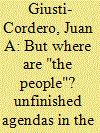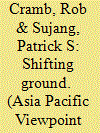| Srl | Item |
| 1 |
ID:
109978


|
|
|
|
|
| Publication |
2011.
|
| Summary/Abstract |
The People of Puerto Rico is a comprehensive ethnography of major types of rural communities in pre-1950 Puerto Rico but was less successful in reconnecting those localities in a coherent portrayal of the island's social formation. A reexamination of this work's best-known subcultures, Santa Isabel (Sidney Mintz' "Cañamelar") and Ciales (Eric Wolf's "San José"), offers entry points to these communities, as well as to the key concepts that Mintz and Wolf constructed reciprocally through their research: rural proletarian and peasant, plantation and hacienda. Also present are the too-implicit spatial referents of these concepts-lowland and highland, foreland and hinterland-and their associated crop types, sugar and coffee. In this article, the historical space of Santa Isabel and Ciales will be reconsidered, in part with reference to often-overlooked nuances and caveats in Mintz' and Wolf's chapters. Foregrounding the spatial/ecological referent in "Cañamelar" and "San José" opens our sights to counterpoints between sugar and livestock, and to patterns of highland-lowland migration, kin networks, and social interaction. Familiar concepts take on new meanings as we discern supra-municipal, sub-insular, and intermediate island regions and move closer to specifying historical situations (Mintz) while renewing our theorization (Wolf).
|
|
|
|
|
|
|
|
|
|
|
|
|
|
|
|
| 2 |
ID:
151239


|
|
|
|
|
| Summary/Abstract |
As the continued health of the plantation sector in Sri Lanka remains a vital part of the Sri Lankan economy, so too must the continued well-being of the people working and living in the estates remain an important concern. The tea industry must confront several challenges in the near future, some which have remained unaddressed for several decades and others that are only now becoming apparent. This paper analyses the current challenges and opportunities facing the people involved in the plantation economy in Sri Lanka – most specifically, the Up-country Tamils, who comprise most of the labour force. Arguably, the plantation system is an unethical economic scheme engendering a parallel political structure to reinforce the plantation economy. Despite some changes to the system during the nearly 200-year existence of plantation economics in Sri Lanka, transformative structural reform remains elusive, with the plantation sector dependent on a resident labour force that exercises limited power over both the economy in which they participate and the spaces they inhabit. This article thus focuses on the efforts of Up-country Tamils to challenge patterns of power and control in the plantation region and forge a new society within an increasingly authoritarian post-war state.
|
|
|
|
|
|
|
|
|
|
|
|
|
|
|
|
| 3 |
ID:
106698


|
|
|